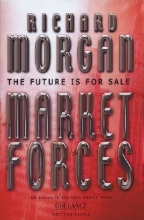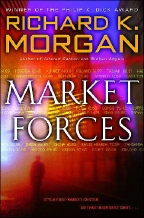Market Forces
Victor Gollancz / Orion Publishing House
UK Hardcover First
ISBN 0-575-07512-0
Publication Date: 03-04-2004
385 Pages; £10.99
Date Reviewed: 01-30-04
Reviewed by: Rick Kleffel © 2004
|

|
Market Forces
Ballantine Books
US Trade Paperback First
ISBN 0-345-45774-9
Publication Date: 03-01-2005
464 Pages; $14.95
Date Reviewed: 01-30-04
Reviewed by: Rick Kleffel © 2004 |
|
|
REFERENCES
|
COLUMNS
|
|
Science
Fiction, Horror,
General
Fiction
|
03-21-02,
04-15-02,
04-29-02,
01-07-03,
01-27-03,
02-25-03,
01-02-04
|
Chris Faulkner, the main character of Richard Morgan's brutally
satiric novel 'Market Forces', represents the end point of an
economic evolution already well underway. He's a well-turned heel who
must, in the progress of the novel, learn to re-define his
"conscience" as that which preserves him at any price. In a world
where the United States Pentagon presents a plan called the Policy
Analysis Market (PAM), under which economists would place bets on the
likelihood of future terrorist attacks in order to better predict
them, parody is pretty hard to pull off. But Morgan manages the neat
trick pursuing current economic trends to their violent conclusions
while making us care about the fate of his heartless characters. In
fact he goes the Pentagon one better. 'Market Forces' carefully,
cheerfully coerces the reader into rooting for Faulkner's ruthless
elimination of anything remotely resembling a conscience, a heart or
empathetic identification with your fellow human beings. It turns out
that survival of the fittest is the best hope for mankind's continued
survival. As long as you're on the right end of the baseball bat.
As 'Market Forces' begins, Chris has just landed a plum job. He's
moved on from Emerging Markets at Hammet McColl and into Conflict
Investment with Shorn Associates, the UK's leading mercenary
investment firm. His big kill at H&M earned him quite a
reputation in that firm. But backing up five times over the body of a
dead banker only gets him to the bottom of the ladder at Shorn.
Fortunately, Mike Bryant, who himself is clearly partner material at
Shorn, takes Chris under his wing. Chris's wife, Carla, is his ace in
the hole. She's a mechanic who has modified his Saab with her own
brand of distanced armor, which keeps his car lightweight,
maneuverable and deadly. But Chris's direct supervisor, Louise
Hewitt, dislikes and distrusts him. She thinks he's soft. Chris might
be a superstar executive, if only he can manage to survive.
Morgan's setup synthesizes a number of influences from both sides
of the academic divide. Both within novel and in an afterward, he
cites sources such as Noam Chomsky, John Pilger, Joseph Stiglitz and
William Easterly. Their bleak visions of the rapacious capitalism
that's running ever more rampant inform the world he creates in
'Market Forces'. The luxury gap has become virtually uncrossable.
Corporate entities exercise a power that transcends government.
Horrific slaughters are carried out by corporate police and
manipulated by suited economists from air-conditioned skyscrapers.
Same as it ever was, right?
There's one little catch. Morgan borrows as easily from the bottom
as the top, so with your high-minded economic influences, you'll find
a seamless integration of breathtakingly funny B-movie violence.
Start your engines with 'Death Race 2000' and finish the game with
'Mad Max' as corporate economists fight for their right to oversee
overseas accounts with hopped-up BMW battle-wagons. Morgan takes
today's road rage to its logical conclusion as a means of getting
ahead in the vicious world of corporate warfare. But he does so with
a very deft hand. He unreels the backstory of his year 2049 with the
élan required to make it stick. It doesn't seem farfetched, or
even frightening. It's merely frighteningly logical.
The glue that holds all this together is Chris Faulkner. If Morgan
is to succeed in his satiric intentions, he's got to keep his reader
squarely on Faulkner's side. What Morgan manages is something along
the lines of a reversed 'A Clockwork Orange'. In 'Market Forces',
Chris Faulkner starts out as a likable guy with a conscience, if not
a heart of gold, in a world that demands violence. While we get to
know and like Chris, he tries to fight against what his world
requires. By the time we really like him, the reader realizes that
this guy is going to need to wield that baseball bat if he's to
survive. And we're there for him every step of the way. Morgan
manages to hit a home run with his inverse journey from kind-of good
to uber-bad. We cheer the character, laugh at the excess and think
about the implications of it all in the safety of our homes.
As regards the economics of it all, Morgan occasionally blurs
around the edges, but it's only the reading equivalent of a sliver of
blue screen seen just before Mel Gibson slams some leather-clad
moto-gladiator upside the head. The book is propulsive enough that
you don't have time to think about all the ugly details, and in fact,
not thinking about all the ugly details is part of the point of the
book. We're all happy to buy plastic-wrapped red, wet slabs of meat
in nice, neat styrofoam trays, and not so happy to see what goes on
in the slaughterhouse. Morgan even manages to make the reader think
about the science-fictional implications of the creation of the game
of rugby.
It's not surprising that 'Market Forces' is something of a wild
ride. It is however, distinctly different than Morgan's previous
novels about the detective Takeshi Kovacs. In 'Market Forces', Chris
Faulkner is handed a novel that is described such that it sounds
suspiciously like Morgan's first novel, 'Altered Carbon'. He thinks
that, "It all seemed very far-fetched." That's an interesting and
rather typical role-reversal for 'Market Forces', which may itself
seem rather far-fetched. That's probably why Morgan made sure that
those economics-tome references were there. But we all live in
Morgan's world, and we don't need a weatherman to see which way the
wind blows. We're all subject to 'Market Forces'. Few of them
however, are as enjoyable as this novel. Fewer still have done as
much for baseball.

